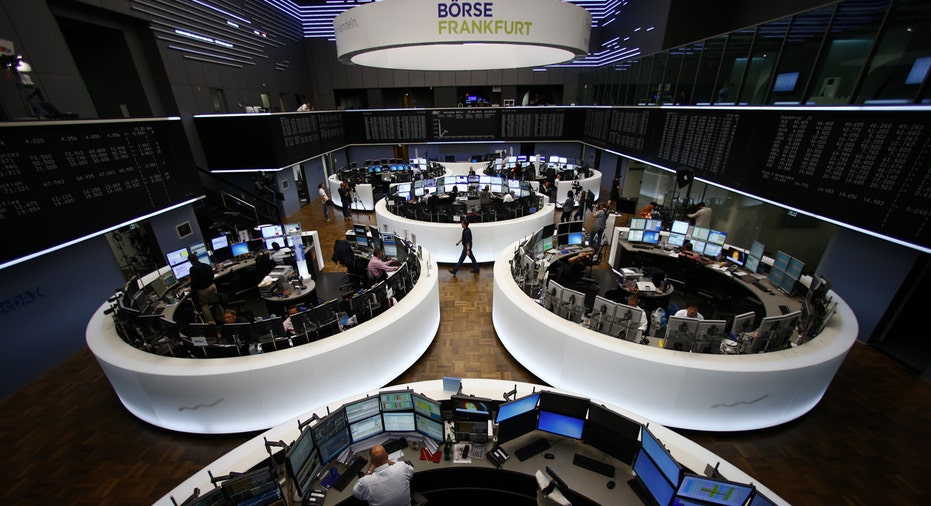Futures Drop, Global Stocks Slide on Oil Rout

As of 7:00 a.m. ET, Dow Jones Industrial Average futures were 320 points lower, or 2.02% to 15592. S&P 500 futures dropped 37 points, or 1.96% to 1836, while Nasdaq 100 futures fell 88 points, or 2.12% to 4057.
(The following is the original story published by Dow Jones Newswires)
Global stocks resumed their recent selloff Wednesday as oil prices sank to a 12-year low and resurgent concerns about global growth snapped a brief bout of stabilization in financial markets.
Shares in Asia and Europe were sharply lower and investors favored perceived havens such as the yen, gold and U.S. Treasurys.
Analysts said investors were spooked by further declines in oil prices and a lack of stimulus announcements from Beijing in the wake of data released Tuesday showing slowing growth.
The Stoxx Europe 600 was down 3% in early trade, bringing losses for the year close to 12%.
In Asia, Japan's Nikkei Stock Average fell 3.7% to enter a bear market, as the dollar lost 0.6% against the yen to Yen116.7520. A stronger yen cuts into the profits of Japanese exporters who repatriate earnings from overseas.
Futures pointed to a 2.3% fall for the S&P 500. Changes in futures don't necessarily reflect market moves after the opening bell.
Wednesday's losses follow a more upbeat start to the week for markets, as concerns about China's slowing economy and weakening oil prices appeared to abate and hopes for more stimulus from China's central bank brought comfort to some investors.
However, by the time U.S. markets closed Tuesday, the Dow was left with minuscule gains, as further falls in commodities prices and mounting jitters about the world's second-largest economy returned to the fore.
Oil prices dropped further Wednesday, with Brent crude trading down 3% at $27.88 a barrel and WTI also falling, weighing on Europe's energy and basic resources sectors.
The International Energy Agency said in its latest report Tuesday that oil prices would likely slide further this year as the market adjusts to the extra oil from producers such as Iran.
Continued downward pressure on the oil price has hit equities hard in recent weeks. Many investors believe stock markets will remain volatile until oil prices find a floor, as pockets of the energy sector increasingly face the prospect of bankruptcies and economies that depend on natural resources come under pressure.
Fears about the global economy have also worried investors so far this year. On Tuesday, official data showed China posted its weakest annual pace of growth in a quarter century, while the International Monetary Fund once again cut its outlook for the world economy.
The brutal start to the year has left major indexes around the world with double-digit losses. While markets have staged small rallies, gains haven't lasted as renewed volatility in oil prices have kept buyers on edge.
Global markets are vulnerable, and "there isn't the same cushion as before," said Giles Fitzpatrick, a partner at Hannam & Partners, noting that increased concerns about China come at a time when investors also have to contend with a raft of other issues: The stronger dollar is weighing on emerging markets, the lifting of Iranian sanctions is adding further pressure to the oil price, and the Federal Reserve is raising interest rates for the first time in nearly a decade.
The Fed raised benchmark interest rates in December, ending years of easy money policy that boosted asset prices.
"These things come in quick succession," Mr. Fitzpatrick said, adding "people wonder how much ability the world's central banks have to absorb the shock."
Elsewhere in Asian markets Wednesday, stocks in Hong Kong fell below 19,000 for the first time over three years as its currency dropped to its lowest level since 2007.
Losses in the volatile Shanghai Composite Index were comparatively muted, as the index lost 1%, while Australia's S&P ASX 200 fell 1.3%.
In currencies, the euro was down 0.3% against the dollar at $1.0950 as investors looked ahead to consumer price data from the U.S. later Wednesday and a meeting of the European Central Bank on Thursday.
While analysts don't expect immediate action, many expect the ECB to roll out additional stimulus measures later this year as the eurozone grapples with persistently low inflation.
Commodity linked currencies, such as those in Australia and Canada, came under pressure.
Gold, traditionally seen as a haven, gained 0.5% to $1093.90 an ounce.
Chao Deng contributed to this article.
Write to Riva Gold at riva.gold@wsj.com



















